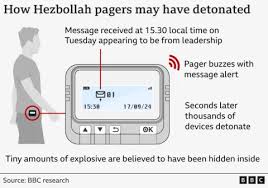As investigative journalists continue to probe the Hezbollah exploding pager story, seeking more details for their readers, there's a point to be made for compliance officers; is there anything that you can take from any financial crime story, which will aid you in your work? Personally, I am always looking for those minute details that might provide valuable insight into tradecraft, so that one will be on alert for that same technique, either when someone attempts to use it on you in the future, or for you to use against your criminal adversaries.
Now, on to that little bit of information previously not appearing in the Hezbollah pager story: we already know that there were three front companies set up to shield the operators of the scheme from discovery: one in Hungary, one in Bulgaria, and possibly one in the Czech Republic (last one not verified), but there's something else not previously reported: the operators then had to find a way into Hezbollah's covert purchasing agent network.
To do that, they then had to identify the terrorist organization's own front and shell companies, which they used to make anonymous commercial purchases. Apparently this was facilitated by the operators selling legitimate products to other buyers in the marketplace, where they became visible to Hezbollah purchasing agents, and the rest is history. Of course, the operators had to identify which of the front companies seeking the pagers were Hezbollah; I assume the locations, in predominantly Shiite areas of Lebanon gave them away, but we do not know that yet.
Takeaway; Compliance officers should understand that sometimes, entities with a hidden agenda ( e.g. money laundering or fraud) may actually operate legitimate business enterprises, for the purposes of attracting targets, which they can exploit, because a level of familiarity and trust was created by the legitimate business that they engaged in. Bankers do not conduct a personal visit to the client's factory or office anymore; they rely upon the Internet to confirm that an active business exists at the principal address, but here again, temporarily running a real business makes it appear legitimate.
Good compliance officers look for a track record of operation, going back a while, and don't rely upon a new, seemingly active, business. They know what a shelf company is, and will make a "lookback" historical check to insure that they have something that is real, when finding a suspicious activity that might be money laundering.

No comments:
Post a Comment
Note: Only a member of this blog may post a comment.